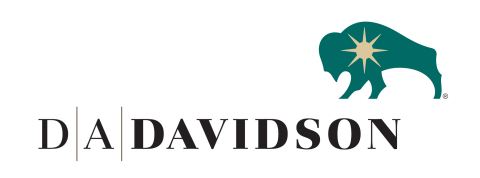Most Americans Are Concerned About the Election’s Effect on Markets, D.A. Davidson Survey Finds
Most Americans Are Concerned About the Election’s Effect on Markets, D.A. Davidson Survey Finds
Six in ten Americans expect that the outcome of the election will lead to an increase in inflation.
LOS ANGELES--(BUSINESS WIRE)--D.A. Davidson & Co. today announced survey results revealing that most Americans (85%) are concerned about how the outcome of the upcoming U.S. presidential election will affect the markets.
Additionally, 78% of Americans are anxious when thinking about their financial situation in the context of the election results. Further, six in ten (60%) expect that the outcome of the election will lead to an increase in inflation.
Some Americans are even acting upon their election-related financial concerns – four in ten Americans who have investments have either already made changes to their portfolio (i.e., IRA, 401(k), stock portfolio, etc.) or plan to make changes in the next six months in anticipation of the election. Younger investors – Millennials (55%) and Gen Z (53%) – are more likely to make changes to their portfolio ahead of this year’s election compared to their older peers – Gen X (40%) and Baby Boomers (18%).
“The markets don’t like uncertainty, and the outcome of the U.S. presidential election is a big question mark,” said Andrew Crowell, Vice Chairman of Wealth Management at D.A. Davidson. “While it’s natural to be concerned about how the election could impact the market, any resulting turbulence usually represents short-term fluctuations that should not dramatically alter your investment strategy. It’s important for investors to stay the course and keep their long-term financial goals in mind.”
Many Americans are taking on a second job just to make ends meet
The data also reveals that three quarters of Americans (75%) have found it challenging to pay basic expenses over the past six months. Generationally, Millennials (85%) have struggled the most, followed by Gen X (78%), Gen Z (77%) and Baby Boomers (67%).
In fact, almost 3 in 10 (29%) respondents cited their top financial concern as affording daily expenses. Even among respondents with a household income of $100,000 or more, 16% consider paying basic expenses their biggest financial concern. Persistent inflation (21%) and the U.S. presidential election results (14%) follow as the second- and third-most common financial concerns.
Close to half (42%) of Americans who currently work a second job started this second job within the past year, and 4 in 10 (40%) say they took it on in order to afford basic expenses.
The most common circumstances for beginning a second job are:
To be able to afford basic expenses |
40% |
To keep busy |
16% |
To pursue a passion project |
14% |
To be able to save for retirement |
9% |
To be able to afford non-basic expenses (e.g., vacation) |
6% |
To diversify my skillset to improve my future job prospects |
7% |
To protect myself in case I lose my primary job |
5% |
Other |
4% |
Debt management and retirement savings are slipping through the cracks
43% of survey respondents who have federal student loans have not been able to make all of their student loan payments since they resumed in October 2023.
Additionally, nearly half (47%) of those surveyed are not currently contributing to a retirement savings account, and almost one-third (32%) say they do not have any retirement savings at all.
“These results confirm what we already knew – Americans are continuing to feel the pinch of sustained inflation. At a time of heightened uncertainty, working with a financial advisor can help make financial goals feel more within reach,” said Crowell. “It’s always a good idea to take a goal one step at a time. For instance, starting by saving just 1% of your paycheck for retirement is better than nothing at all – and from there, it’s easier to add another 1% every month or two months until your saving rate is where you want it to be.”
Methodology
This survey was conducted online by Big Village. The survey was fielded from May 10-12, 2024, among a demographically balanced nationally representative sample of 1,014 U.S. adults 18 years of age and older.
About D.A. Davidson Companies
D.A. Davidson Companies is an employee-owned financial services firm offering a range of financial services and advice to individuals, corporations, institutions and municipalities nationwide. Founded in 1935 with corporate headquarters in Great Falls, Montana, and regional headquarters in Denver, Los Angeles, New York, Omaha and Seattle, the company has approximately 1,600 employees and offices in 29 states.
Subsidiaries include: D.A. Davidson & Co., a full-service investment firm providing wealth management, investment banking, equity and fixed income capital markets services, and advice; Davidson Investment Advisors, a professional asset management firm; and D.A. Davidson Trust Company, a trust and wealth management company.
Contacts
Katie Frost, Prosek for D.A. Davidson
Kfrost@prosek.com
